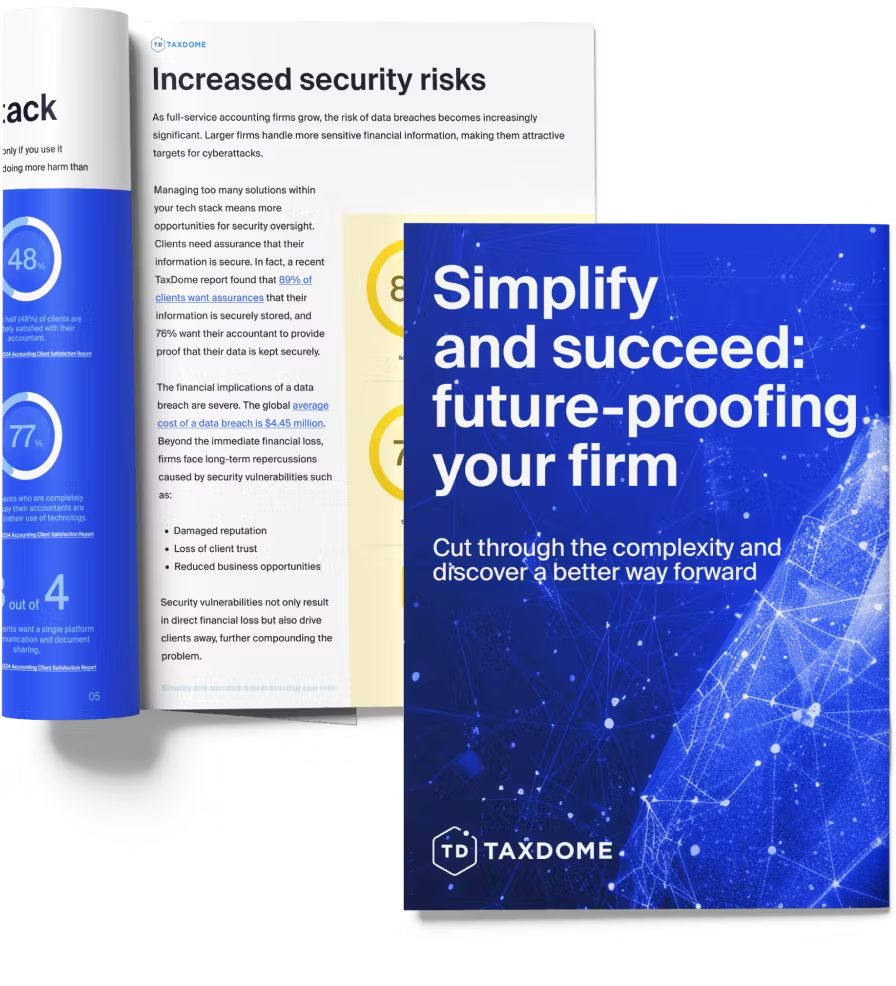
For an industry built on trust, accuracy, and integrity, accounting fraud is disturbingly widespread. According to a recent study, 41% of companies are estimated to commit accounting violations each year by deliberately misrepresenting their financial reports.
Committing accounting fraud is like playing with fire, with hefty fines and reputational damage for businesses that get caught. For this reason, it’s crucial to understand what constitutes accounting fraud, the consequences of committing it, and how it can be prevented.
In this article, we’ll explain everything you need to know about accounting fraud, so you can protect your staff, clients, and accounting firm from harm.
What is accounting fraud?
Accounting fraud is the deliberate manipulation of financial statements and records to present a false picture of a company’s financial position. This typically involves concealing, adding, or altering transactions, so that financial reports look healthier than they actually are.
A serious criminal offense, accounting fraud has wide-ranging repercussions for the individuals and organizations involved. There have been plenty of high-profile accounting fraud examples over the years, from the Enron scandal of the early 21st Century to the demise of Lehman Brothers several years later. But accounting fraud isn’t limited to global enterprises — it can happen at any level of business.
Types of accounting fraud

Accounting fraud can take many forms, with perpetrators using all manner of “creative” methods and illegal loopholes to conceal the truth about their company’s financial health. In this section, we’ll highlight some of the most prevalent types of accounting fraud.
Falsifying financial statements
This involves intentionally altering financial records to present a misleading picture of a company’s financial position. The goal here is to deceive stakeholders, including investors, creditors, and regulatory agencies, often in an attempt to cover up poor financial performance. For example, company insiders might:
- Overstate sales figures or create fake invoices to make the company appear more profitable than it actually is, in an attempt to attract investors or obtain loans with more favorable terms
- Deliberately hide or omit operating expenses in an attempt to “improve” the company’s bottom line
Embezzling company funds
Embezzlement is a form of financial fraud that involves an employee, executive, or business owner stealing company assets or funds for personal gain. This can involve diverting company money away from what it was originally intended for or using company funds without authorization. For example:
- A business owner might siphon off investor money intended for business expansion to a personal account, without the investor or other stakeholders knowing
- The business owner might then cover up their actions by falsifying accounting records to avoid detection
Misappropriating company assets
This involves employees or executives misusing company resources for their own personal gain. This type of fraud can be hard to detect as it may involve small, incremental amounts over time. For example:
- An employee in the finance department might divert company funds to a personal account under the guise of a “purchase”
- An inventory manager might steal physical goods and then cover their tracks by manipulating records
Fraudulent payroll activities
Payroll fraud involves manipulating the payroll process to steal unearned company money. This might involve altering work hours in the payroll system, creating “ghost employees” who don’t really exist, or receiving unauthorized or illegitimate bonuses or benefits. For example, a manager might:
- Create fake employee records and then pocket their salaries and/or benefits
- Award themselves performance-related bonuses based on fake results
Expense reimbursement fraud
This type of accounting fraud involves employees submitting false or misleading expense reports, enabling them to receive reimbursements that they aren’t entitled to. For example, a manager might:
- Submit receipts or records for non-work-related travel expenses
- Purchase personal items and falsely categorize them as work-related expenses
How to identify the warning signs of fraud
As an accounting professional, being able to spot the warning signs of fraudulent activity will help you maintain the integrity and accuracy of your financial accounts. In this section, we’ll highlight some telltale signs of accounting fraud to look out for.
Discrepancies in financial records
If you spot any inconsistencies, unexplained discrepancies, or unusual patterns in a company’s financial statements, it’s worth investigating further. For example:
- Unexplained variances between reporting figures
- Increasing revenues while cash flows are stagnant
- Quarterly results that go against long-term trends, especially in Q4
- Strong financial performance despite clear economic or organizational headwinds
Suspicious transactions
Keep a lookout for unusually large transactions that don’t correspond with regular company patterns or operations. For example:
- Repeated small transactions that fall just below the threshold for manual approvals
- Unexplained large cash withdrawals or deposits
- Large transfers to unknown vendors or offshore accounts
Unexplained adjustments
Unexplained adjustments are another red flag, especially if they happen towards the end of a reporting period and cannot be justified or backed up through documentation. For example:
- Significant write-offs of inventory or receivables without adequate explanation
- Frequent adjustments made to financial statements close to the fiscal year-end
- Large, round-number adjustments with vague descriptions such as “miscellaneous”
Missing documents
If you spot any incomplete records or a lack of supporting documentation for transactions, you may want to dig a little deeper. For example:
- Missing invoices and receipts for significant transactions/expenses
- Key financial records that cannot be located during an audit
- Missing vendor contracts or agreements relating to large transactions
Overriding accounting controls
Internal controls are in place for a reason — to ensure consistent processes that align with business best practices and regulatory requirements. When internal controls get overridden on a regular basis, it’s a big red flag. For example:
- Managers approving their own expenses
- Finance team ignoring or overriding audit recommendations
- Employees bypassing the standard approval processes for large purchases
Consequences of accounting fraud
Accounting fraud is a criminal offense that comes with serious legal and financial repercussions. Depending on the offense in question, perpetrators can face lengthy prison sentences, while businesses may receive six-figure fines from regulators and government agencies
Beyond these tangible consequences, accounting fraud can also cause significant reputational and brand damage that can cripple business operations and stunt growth. When clients, investors, and even staff lose trust in a business, it can be extremely difficult to recover and move forward.
Who is responsible for monitoring accounting fraud?
Detecting accounting fraud is a collaborative effort, combining internal staff, independent third parties, and government agencies. In this section, we’ll look at the different people and entities involved in detecting accounting fraud and the roles they play.
Internal auditors
Internal auditors are a company’s first line of defense against accounting fraud. By evaluating how effective their business’s internal controls, risk management, and governance processes are, they are well placed to put safeguards in place and detect potential anomalies that could point to fraud.
External auditors
External auditors provide an additional level of assurance. Because they are independent third parties, they can provide a more objective, detached review of processes and financial statements. They can also perform compliance checks to ensure that a company’s financial reporting adheres to accounting regulations and standards.
Regulatory bodies
Regulatory bodies, such as the US Securities and Exchange Commission (SEC), are responsible for setting and enforcing financial regulations. These regulators act like cops on the beat, conducting investigations, bringing enforcement actions, and dishing out hefty fines for non-compliance.
Law enforcement agencies
Law enforcement agencies such as the Department of Justice (DOJ) and the Federal Bureau of Investigation (FBI) are responsible for investigating criminal cases of accounting fraud. They have the power to issue warrants and subpoenas and bring criminal charges against the individuals and organizations involved in fraudulent activities.
Whistleblowers
Whistleblowers also play an important role in reporting on instances of accounting fraud. Usually company insiders, they step forward to alert senior members of staff or even law enforcement agencies when they suspect something underhand is taking place. In most cases, whistleblowers are protected against retaliation in the USA under the Sarbanes-Oxley Act.
How to prevent accounting fraud
Detecting accounting fraud is one thing, but how do you go about preventing it altogether? In this section, we’ll highlight some steps you can implement to safeguard your business and create a culture of accountability and transparency.
1. Implement strong internal controls
Internal controls are there to ensure the integrity of your financial reporting and protect your company from irregular, non-compliant, or rogue processes, including accounting fraud. Here are a few examples you can implement:
- Segregation of duties: ensure that no single employee has control over a critical financial process
- Authorization protocols: introduce clear, multi-level approval processes for transactions over a certain threshold
- Account reconciliation: ensure that accounts are reconciled at regular intervals so that records match actual balances
- Systematize processes: use internal checklists, templates, and audit trails to ensure that processes are consistent and transparent
2. Conduct regular audits
Conducting regular audits ensures that your accounting processes and procedures are efficient, transparent, and compliant. There are different approaches you can combine to maximize the impact of audits, including:
- Internal audits at regular intervals
- External audits by independent third parties
- Surprise audits to catch irregularities
3. Leverage technology
When it comes to efficient accounting processes, technology is your best friend — and fraud prevention is no different. There are all sorts of tools you can implement to help prevent fraudulent activity, from AI-powered fraud-detection and audit software to accounting practice management platforms, such as TaxDome.
TaxDome offers the following features to help you improve efficiency, accuracy, and transparency:
- Automated workflows, including invoicing and payments
- Granular access rights and permissions
- Robust security, with two-factor and biometric authentication
- Secure document management
- Time-stamped audit trails and activity logs
- CRM for a complete view of all client data and interactions
4. Organize employee training
Education can play an important role in preventing accounting fraud. By conducting regular training sessions designed to help employees recognize and flag suspicious activities, you may be able to spot issues before they escalate. Additionally, you can establish clear policies to protect and encourage whistleblowers to step forward without fear of repercussions.
5. Establish an ethical, transparent culture
You can go some way to preventing fraud from happening by creating a culture that promotes the importance of ethical business practices and transparent processes. Here are some ways you can achieve this:
- Establish a firm-wide code of conduct that employees must read and formally agree to uphold
- Ensure that company leaders demonstrate ethical, trustworthy behavior
- Foster an environment of open communication, transparent practices, and accountability
To sum up
Accounting fraud is a serious offense that involves the deliberate manipulation of financial statements, records, and transactions in an attempt to mislead stakeholders about the true nature of a company’s health. Businesses found guilty of committing accounting fraud are subject to hefty fines, legal charges, and reputational damage.
With this in mind, you must do everything you can to prevent accounting fraud from happening. This means putting rigorous internal controls in place, conducting regular audits, and being vigilant when reviewing accounting records.
Technology can also help here. With TaxDome, for example, you get detailed audit trails that monitor, record, and time stamp every interaction with documents, tasks, clients, and more. And with time-tracking tools alongside automated invoices and payments, you can rest assured that you’re always billing the right amount for the right work.
To see how TaxDome can help you run a highly efficient, transparent, and auditable firm, request a demo today.

Thank you! The eBook has been sent to your email. Enjoy your copy.
There was an error processing your request. Please try again later.
What makes the best accounting firms thrive while others struggle to keep up? We analyzed our top 20 TaxDome firms, representing over $100M in combined revenue, to uncover the strategies driving their success.



